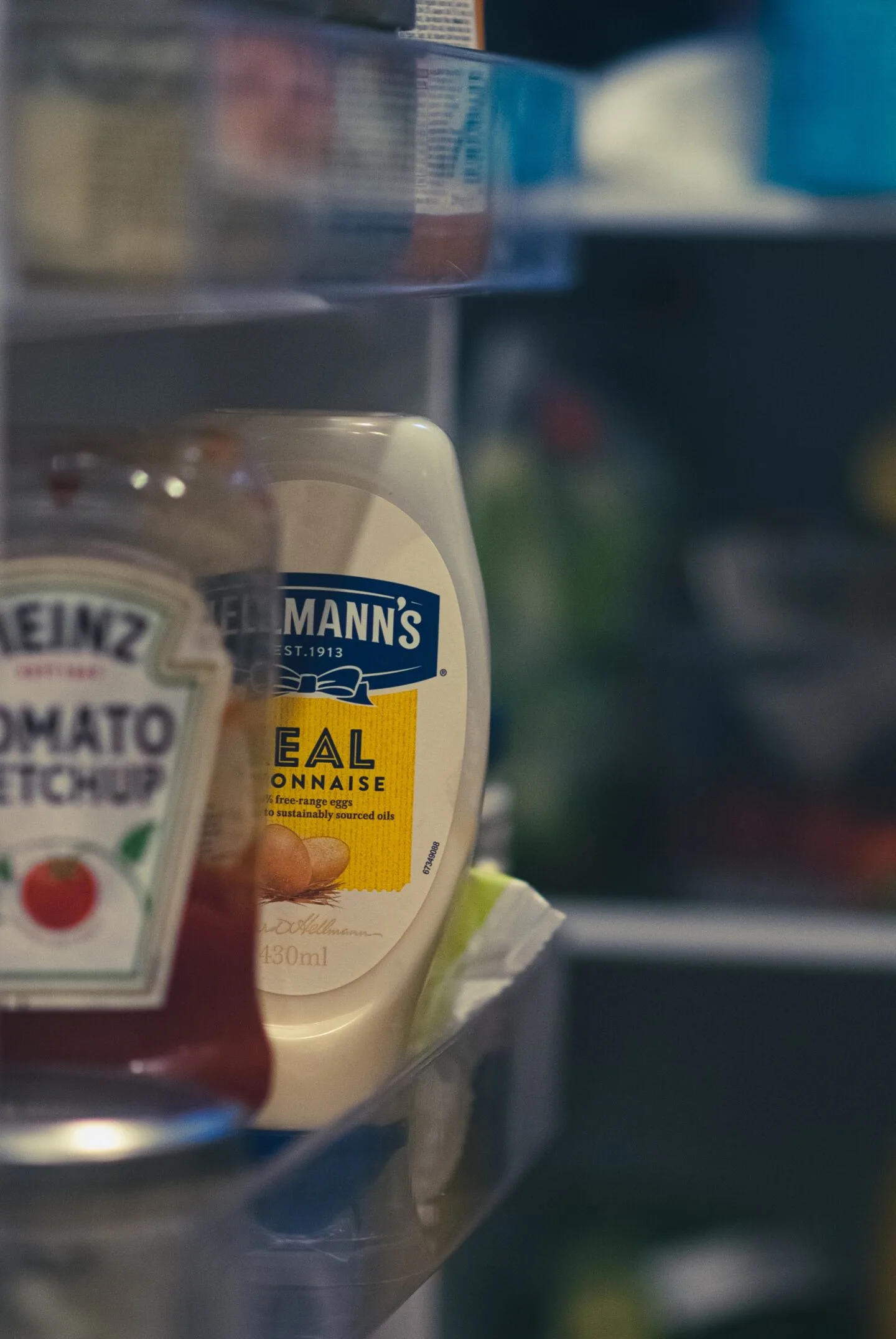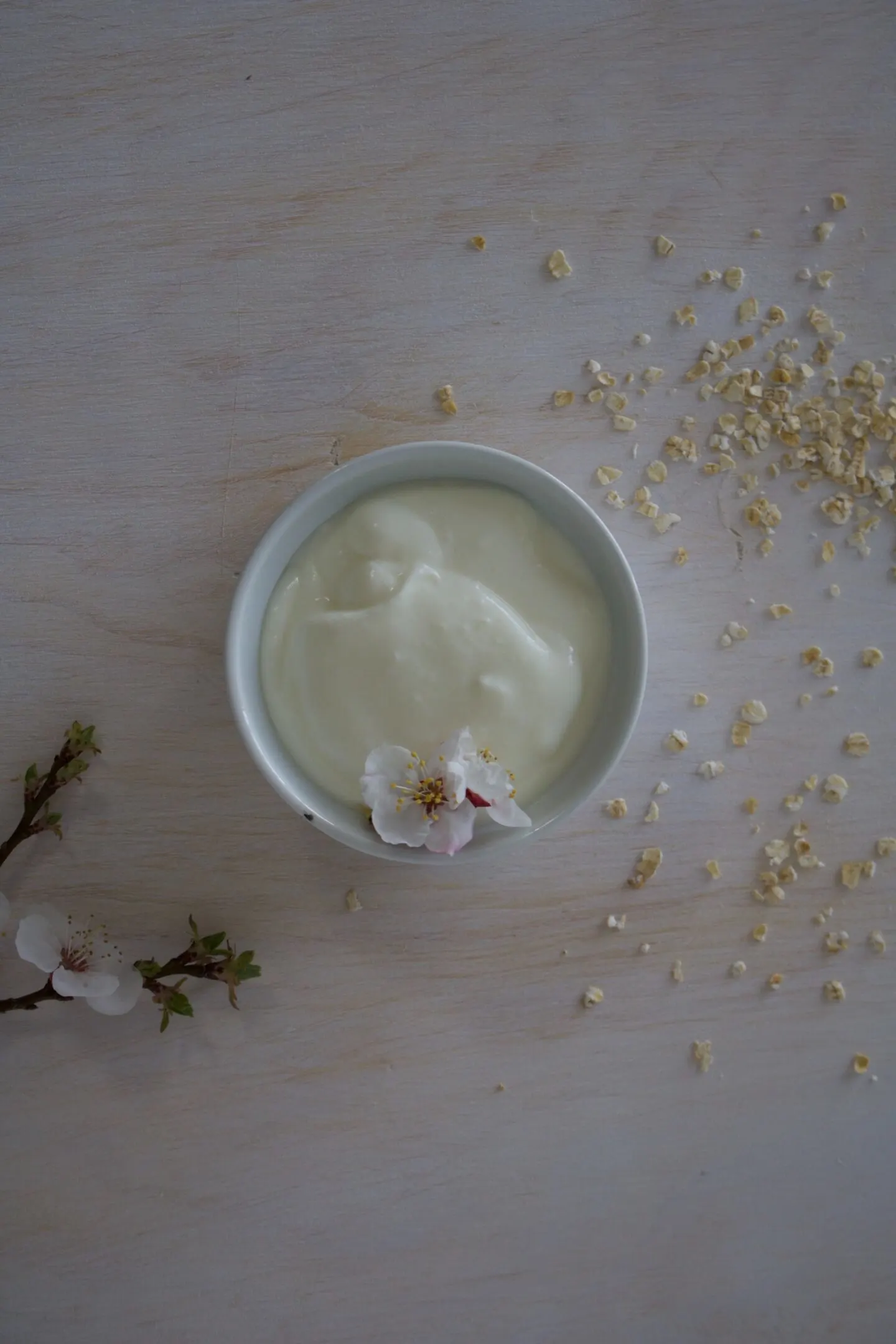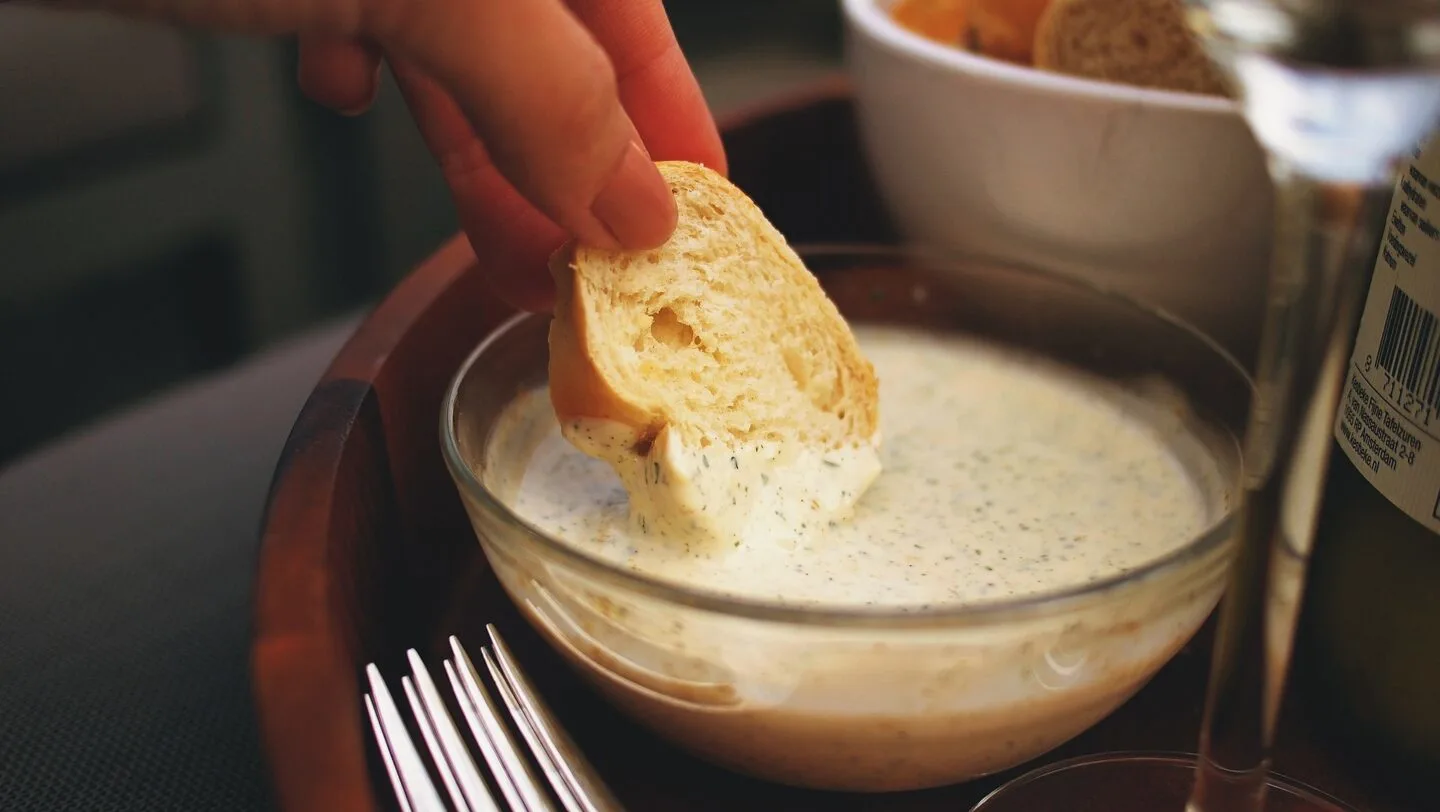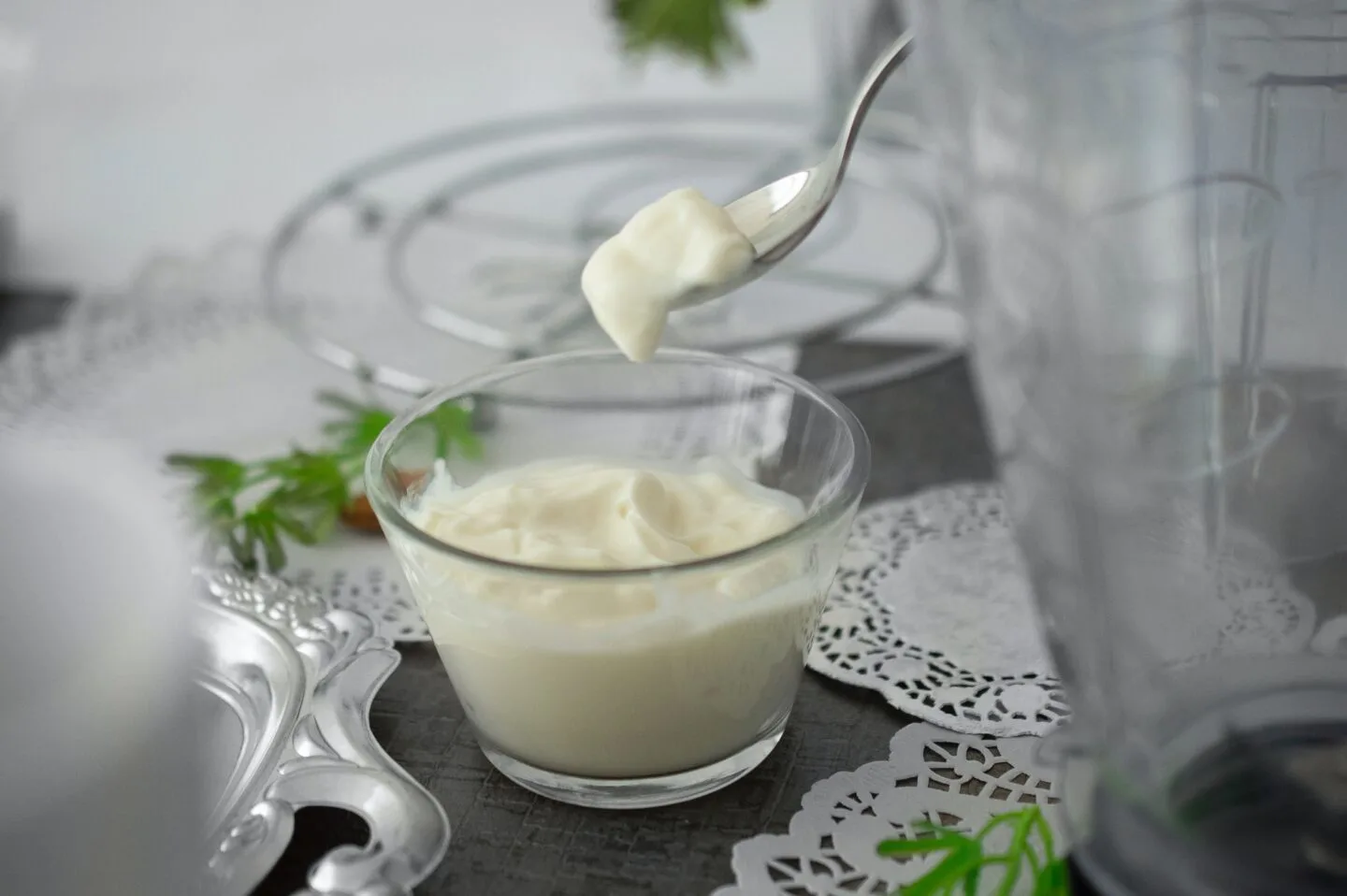As a staple in many foods, sandwiches, and meals, I’m often asked by parents, “can babies eat mayonnaise?”. This question is often in reference to both shop-bought mayonnaise and homemade varieties. The good news is that it’s safe to give your baby mayonnaise from the age of 6 months, as long as it is offered in moderation. If it has been bought from a store (such as Hellmann’s), this is fine for babies to consume straight away. However, with homemade mayonnaise, it should be noted that all eggs used must have the Red British Lion Stamp on them as per the NHS official guidelines.

Advice on how to introduce your baby to mayonnaise.
Knowing the answer to “can babies eat mayonnaise?” opens up a whole new world when it comes to exploring new foods on your baby’s weaning journey. There are loads of great meals and snacks that include mayonnaise as a key ingredient, which we will look into a little further down in this article. First, however, let’s take a look at some of the main pieces of advice that you should read up on before introducing your baby to mayonnaise.
- Always use Red Lion stamped eggs when making your own mayonnaise for babies.
- Health benefits of offering your baby mayonnaise.
- Types of mayonnaise you can offer your baby.
- How can babies eat mayonnaise?
Let’s take a look at each of these points in turn.
Always use Red Lion stamped eggs when making your own mayonnaise for babies.
One of the questions I hear commonly is can babies eat mayonnaise if it’s homemade? According to the NHS, raw or lightly cooked eggs can be eaten by children in the UK as long as they have the red lion stamp on them. Always check the eggs you buy for the red lion stamp and look out for the words “British Lion Quality” on the box when picking out eggs to feed to your children. The red lion stamp indicates that the hens that laid the eggs have been vaccinated against salmonella, a bacteria that can cause infection and result in stomach pains, diarrhoea, fever, and other symptoms.
Health Benefits Of Offering Your Baby Mayonnaise
Mayonnaise, whether freshly made at home or from a supermarket bought jar, does have some health benefits that your baby can take advantage of when given mayonnaise to eat in moderation. First and foremost, mayonnaise is an excellent source of omega-3 and omega-6 fatty acids. These fatty acids are important to the health of your baby’s heart, eyes, bone and joint health, and may even help to prevent asthma in children. Mayonnaise also contains vitamin E and vitamin K which can help to improve heart health and blood clotting. Keep in mind that mayonnaise is mainly comprised of oil, which makes it a high fat and high calorie food.

Types of mayonnaise you can offer your baby.
There are a variety of mayonnaise options that you can offer your baby once you’ve established a good weaning routine.
Regular mayonnaise purchased from shops does not contain any additional flavours or herbs, making it a good starting point when asking can babies eat mayonnaise. Store bought mayonnaise is pasteurised, which again makes it a good choice for babies, however, it is likely to contain more salt than homemade mayonnaise.
Vegan mayonnaise doesn’t contain eggs or any ingredients derived from animals. This makes it a good option for those with specific animal protein allergies or for families bringing up vegan children.
Flavoured mayonnaise can be purchased in stores and can be offered to babies and young children, however, it’s advisable to pay attention to the ingredients list on the variety of flavour combinations. Flavoured mayonnaise products use additional ingredients such as garlic or hot spices to create flavoured condiments; these are better suited for adults. Not only are these mayonnaise options likely to be high in sodium, but they can also contain allergens which could cause reactions in young babies and children.
Finally, homemade mayonnaise made from scratch is a great way to introduce mayonnaise to your baby as you’re able to control all the ingredients, including flavourings and sodium levels. Be aware that homemade mayonnaise isn’t pasteurised and does contain raw eggs, so always ensure you look for the red lion stamp when purchasing eggs to make mayonnaise for your child.
How can babies eat mayonnaise?
Introducing mayonnaise into your baby’s diet can be done in a number of ways. Mayonnaise is a versatile food product and can be served alongside foods as a dip, added to cold ingredients, or even used in cooking. There are a few ways to introduce mayonnaise into babies’ and young children’s diets. My favourite way to introduce mayonnaise is to include it as part of a main meal, for example in our Easy Baby Tuna and Sweetcorn Pasta Salad recipe. Mayonnaise can be added to cooked foods, such as shredded/diced cooked chicken and potatoes or even used to create delicious purees. Remember to serve mayonnaise in moderation, especially if you are using it as a dip or in sandwiches.

Is it possible for your baby to be allergic to mayonnaise?
Yes, it is possible for babies to be allergic to mayonnaise as eggs are a common allergen. If you know that your baby isn’t allergic to eggs, there shouldn’t be an issue when giving them plain mayonnaise. Start small and work your way up, ensuring that you only ever offer them one new food at a time so you can check for reactions and intolerance symptoms.
Signs of allergies in babies
If you’re worried about the possibility of your baby having an allergic reaction after eating mayonnaise, it’s wise to familiarise yourself with the common signs of allergies in babies. If you find that your baby does have an allergy, you’ll most likely notice one or more of the following symptoms:
- Diarrhoea
- Vomiting
- A cough
- Wheezing and shortness of breath
- Runny or blocked nose
- Itchy through and tongue
- Swollen lips and throat
- Red, sore, itchy eyes
If you think your baby is having an allergic reaction, speak to your health visitor or GP as soon as possible. In the case of a severe allergic reaction, seek medical attention by calling 999 immediately. A severe reaction can include trouble breathing and losing consciousness.

Conclusion
Today we have answered common queries such as when can babies eat mayonnaise, which mayonnaise options may be best for babies, how to find the right eggs to make homemade mayonnaise, and how to best serve mayonnaise to your baby. Don’t forget to take a look at the rest of our blog posts, including our baby led weaning recipe archive for fun, tasty, and healthy first food choices.
